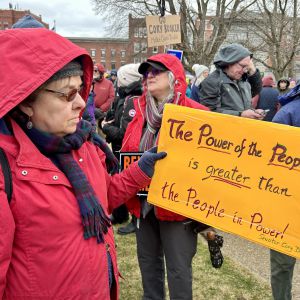House subcommittee formed to address state education funding

ConVal school bus in snow Staff photo by Ben Conant
| Published: 01-09-2024 5:19 PM |
The state’s education funding formula will be the focus of a select group of lawmakers this session hoping to make it more equitable and pass constitutional muster.
The bipartisan group, comprised of members of the House committees on education and finances, will make recommendations on four bills that outline solutions to education funding in New Hampshire.
This work comes on the heels of a court ruling in the Contoocook Valley School District v. State of New Hampshire that determined the base adequacy rate per student – the minimum amount a district must spend – should be $7,356 per pupil. That’s nearly twice as much as the current rate of $4,100.
In the ruling, Judge David Ruoff, in Rockingham Superior Court, paved the way for the legislature to determine a new adequacy rate. But at a minimum, more needs to be spent per student to provide a sufficient education in public schools.
The actual cost to educate a student in the state is closer to $20,000 per pupil. Local taxpayers make up the difference.
Lawmakers are also awaiting a ruling from a tangential case, Rand v. The State of New Hampshire, that challenges the State Wide Education Property Tax. Although Ruoff, who is also hearing the case, has not issued a final verdict, a partial summary judgment this fall indicated that towns that collect an excess amount must return the difference to the education trust fund. Additionally, it is unconstitutional for the Department of Revenue to set a negative tax rate in municipalities to offset SWEPT collection, which often happens in unincorporated communities.
These initial rulings signal to lawmakers that change is needed when it comes to state education funding. Four bills present solutions on how to do so.
■HB 1583 would set the adequacy rate to $10,000 per student
Article continues after...
Yesterday's Most Read Articles
 ‘There was no oversight’: NH child advocate has been a watchdog for children's care. Now, the office is on the chopping block
‘There was no oversight’: NH child advocate has been a watchdog for children's care. Now, the office is on the chopping block
 Volunteer group wants to help homeless clean up their camp
Volunteer group wants to help homeless clean up their camp
 ‘Less finger pointing, more communication’: Longtime Chichester residents share hopes before second town meeting
‘Less finger pointing, more communication’: Longtime Chichester residents share hopes before second town meeting
 Casella Waste Systems’ landfill project in New Hampshire’s North Country denied permit
Casella Waste Systems’ landfill project in New Hampshire’s North Country denied permit
 New Healthy Buffalo owner to build market in Chichester
New Healthy Buffalo owner to build market in Chichester
 ‘It’s everything’: In largest rally yet, Trump protestors descend on Concord
‘It’s everything’: In largest rally yet, Trump protestors descend on Concord
■HB 1586 would reconfigure state funding for education to take into account varying needs per district, rather than a per-pupil calculation for state funding. It also redefines how districts need to address designations of underperforming schools and requires municipalities to provide information about tax relief for low and moderate-income homeowners.
■HB 1686 would reinstate “donor towns” with the State Wide Education Property Tax, meaning that any excess revenue raised from the state tax rate would be returned to the education trust funds. This bill would also prohibit the Department of Revenue from setting a negative tax rate to equalize SWEPT requirements.
■HB 1656 would increase the adequacy rate for students who are receiving special education services from an additional $2,100 to $27,000.
Public hearings for these four bills will be held in the House Education Committee Wednesday starting at 9 a.m. After the committee hearings, the bills will be referred to the subcommittee for review and recommendations.
The committee members from House Finance and Ways and Means will serve in an advisory position – meaning they can participate in discussion but will not vote on legislation in front of the Education Committee. A report on each bill is due out of committee by Feb. 15 and then referred to House Finance.







 Henniker ponders what is a ‘need’ and what is a ‘want’
Henniker ponders what is a ‘need’ and what is a ‘want’ Boscawen residents vote to fund major renovation of public works building
Boscawen residents vote to fund major renovation of public works building ‘Voting our wallets’: Loudon residents vote overwhelmingly against $1.7M bond for new fire truck
‘Voting our wallets’: Loudon residents vote overwhelmingly against $1.7M bond for new fire truck In Pembroke, Education Freedom Accounts draw debate, voters pass budget
In Pembroke, Education Freedom Accounts draw debate, voters pass budget
